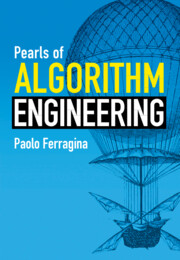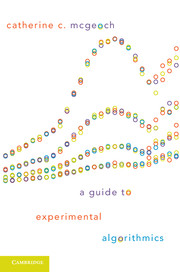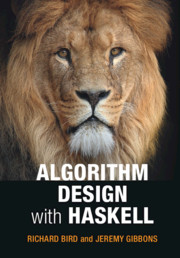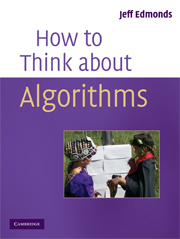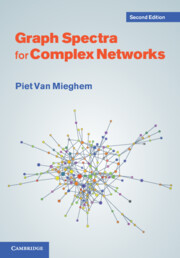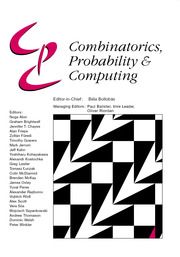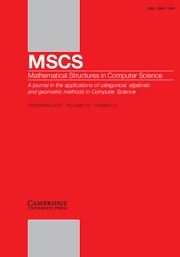Pearls of Algorithm Engineering
£49.99
- Author: Paolo Ferragina, Università di Pisa
- Date Published: June 2023
- availability: Available
- format: Hardback
- isbn: 9781009123280
£
49.99
Hardback
Other available formats:
eBook
Looking for an inspection copy?
This title is not currently available on inspection
-
There are many textbooks on algorithms focusing on big-O notation and basic design principles. This book offers a unique approach to taking the design and analyses to the level of predictable practical efficiency, discussing core and classic algorithmic problems that arise in the development of big data applications, and presenting elegant solutions of increasing sophistication and efficiency. Solutions are analyzed within the classic RAM model, and the more practically significant external-memory model that allows one to perform I/O-complexity evaluations. Chapters cover various data types, including integers, strings, trees, and graphs, algorithmic tools such as sampling, sorting, data compression, and searching in dictionaries and texts, and lastly, recent developments regarding compressed data structures. Algorithmic solutions are accompanied by detailed pseudocode and many running examples, thus enriching the toolboxes of students, researchers, and professionals interested in effective and efficient processing of big data.
Read more- Presents key algorithmic problems and solutions of increasing sophistication arising in the development of big data applications
- Chapters deal with different data types, problems, and corresponding algorithmic tools, allowing professionals, researchers, and students to expand their skillsets
- Pseudocode is provided for all relevant procedures, along with examples and figures, from which readers acquire advanced algorithmic design and analysis principles
Reviews & endorsements
'When I joined Google in 2000, algorithmic problems came up every day. Even strong engineers didn't have all the background they needed to design efficient algorithms. Paolo Ferragina's well-written and concise book helps fill that void. A strong software engineer who masters this material will be an asset.' Martin Farach-Colton, Rutgers University
See more reviews'There are plenty of books on Algorithm Design, but few about Algorithm Engineering. This is one of those rare books on algorithms that pays the necessary attention to the more practical aspects of the process, which become crucial when actual performance matters, and which render some theoretically appealing algorithms useless in real life. The author is an authority on this challenging path between theory and practice of algorithms, which aims at both conceptually nontrivial and practically relevant solutions. I hope the readers will find the reading as pleasant and inspiring as I did.' Gonzalo Navarro, University of Chile
'Ferragina combines his skills as a coding engineer, an algorithmic mathematician, and a pedagogic innovator to engineer a string of pearls made up of beautiful algorithms. In this, beauty dovetails with computational efficiency. His data structures of Stringomics hold the promise for a better understanding of population of genomes and the history of humanity. It belongs in the library of anyone interested in the beauty of code and the code of beauty.' Bud Mishra, Courant Institute, New York University
'There are many textbooks on algorithms focusing on big-O notation and general design principles. This book offers a completely unique aspect of taking the design and analyses to the level of predictable practical efficiency. No sacrifices in generality are made, but rather a convenient formalism is developed around external memory efficiency and parallelism provided by modern computers. The benefits of randomization are elegantly used for obtaining simple algorithms, whose insightful analyses provide the reader with useful tools to be applied to other settings. This book will be invaluable in broadening the computer science curriculum with a course on algorithm engineering.' Veli Makinen, University of Helsinki
Customer reviews
Not yet reviewed
Be the first to review
Review was not posted due to profanity
×Product details
- Date Published: June 2023
- format: Hardback
- isbn: 9781009123280
- length: 326 pages
- dimensions: 251 x 176 x 22 mm
- weight: 0.71kg
- availability: Available
Table of Contents
1. Prologue
2. A warm-up!
3. Random sampling
4. List ranking
5. Sorting atomic items
6. Set intersection
7. Sorting strings
8. The dictionary problem
9. Searching strings by prefix
10. Searching strings by substring
11. Integer coding
12. Statistical coding
13. Dictionary-based compressors
14. The burrows-wheeler transform
15. Compressed data structures
16. Conclusion.
Sorry, this resource is locked
Please register or sign in to request access. If you are having problems accessing these resources please email [email protected]
Register Sign in» Proceed
You are now leaving the Cambridge University Press website. Your eBook purchase and download will be completed by our partner www.ebooks.com. Please see the permission section of the www.ebooks.com catalogue page for details of the print & copy limits on our eBooks.
Continue ×Are you sure you want to delete your account?
This cannot be undone.
Thank you for your feedback which will help us improve our service.
If you requested a response, we will make sure to get back to you shortly.
×
